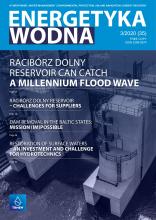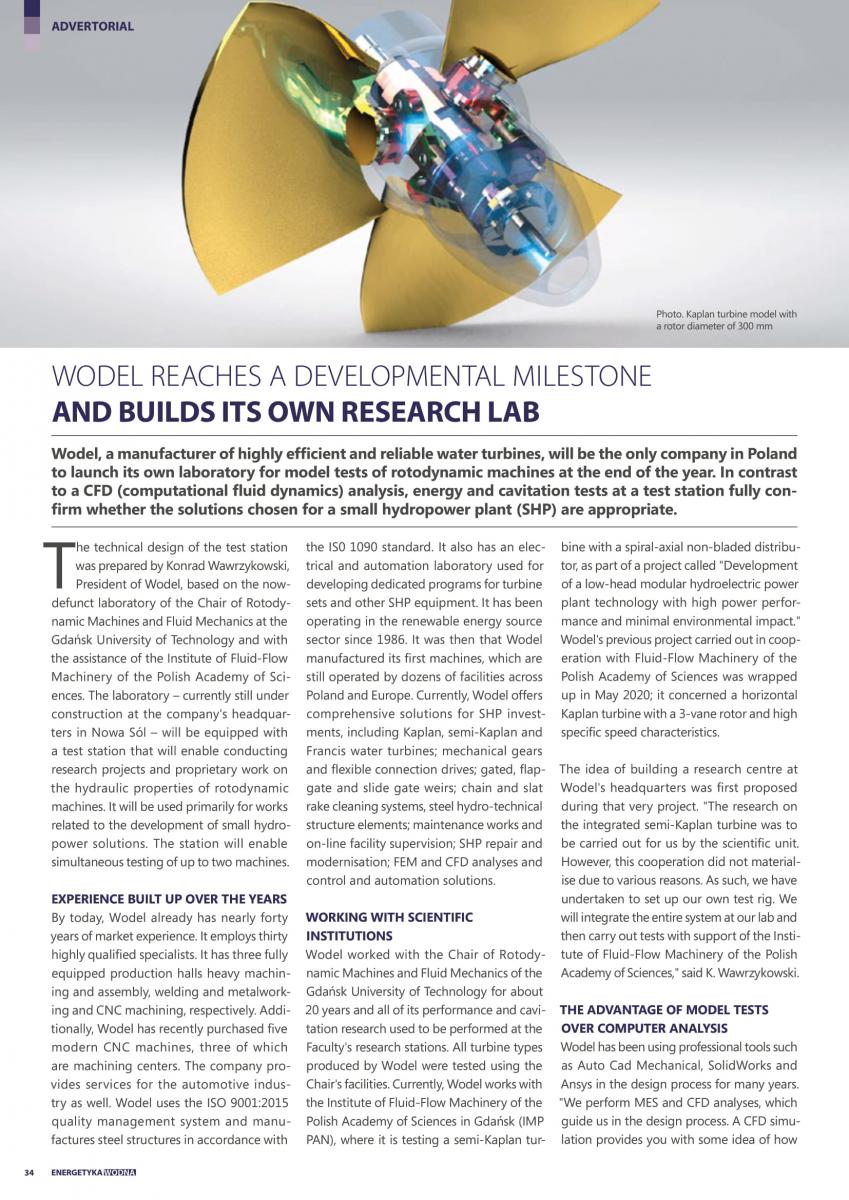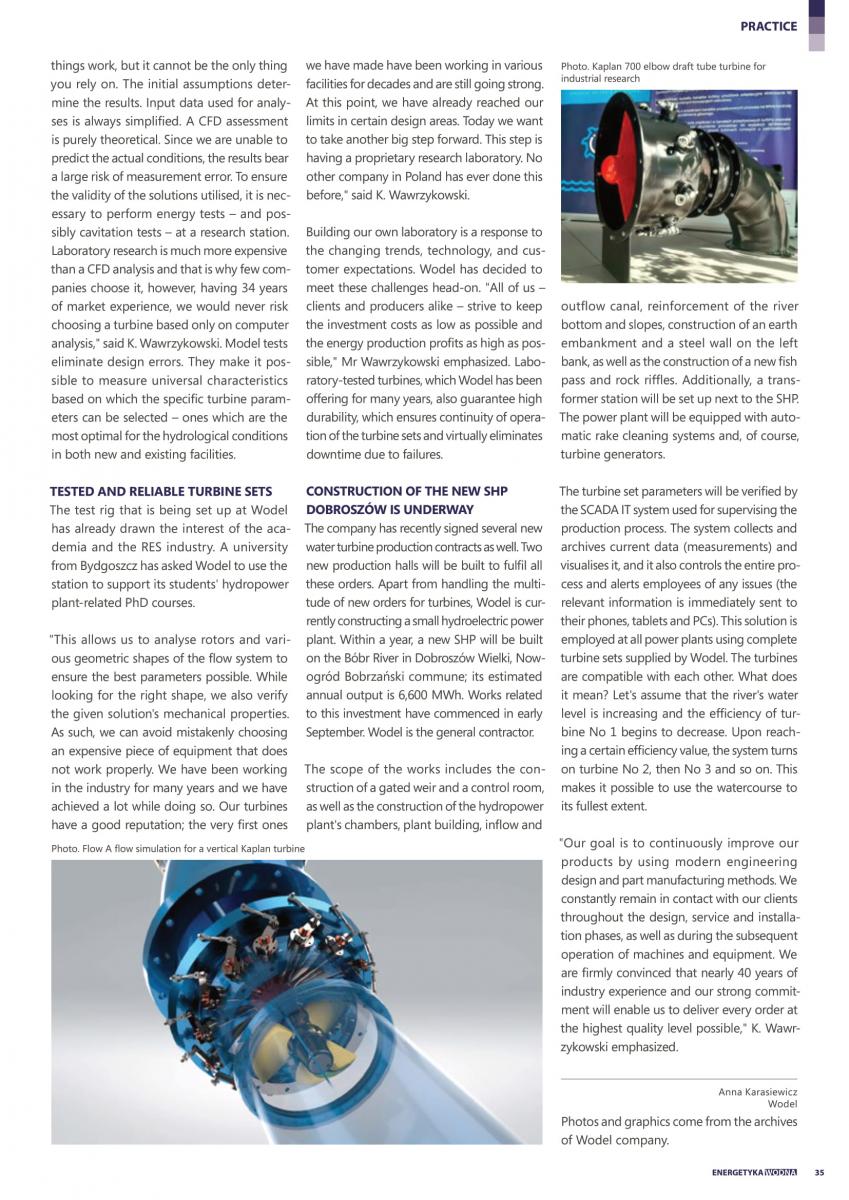WODEL REACHES A DEVELOPMENTAL MILESTONE AND BUILDS ITS OWN RESEARCH LAB

Wodel, a manufacturer of highly efficient and reliable water turbines, will be the only company in Poland to launch its own laboratory for model tests of rotodynamic machines at the end of the year. In contrast to a CFD (computational fluid dynamics) analysis, energy and cavitation tests at a test station fully confirm whether the solutions chosen for a small hydropower plant (SHP) are appropriate.
The technical design of the test station was prepared by Konrad Wawrzykowski, President of Wodel, based on the nowdefunct laboratory of the Chair of Rotodynamic Machines and Fluid Mechanics at the Gdańsk University of Technology and with the assistance of the Institute of Fluid-Flow Machinery of the Polish Academy of Sciences. The laboratory – currently still under construction at the company's headquarters in Nowa Sól – will be equipped with a test station that will enable conducting research projects and proprietary work on the hydraulic properties of rotodynamic machines. It will be used primarily for works related to the development of small hydropower solutions. The station will enable simultaneous testing of up to two machines.
EXPERIENCE BUILT UP OVER THE YEARS
By today, Wodel already has nearly forty years of market experience. It employs thirty highly qualified specialists. It has three fully equipped production halls heavy machining and assembly, welding and metalworking and CNC machining, respectively. Additionally, Wodel has recently purchased five modern CNC machines, three of which are machining centers. The company provides services for the automotive industry as well. Wodel uses the ISO 9001:2015 quality management system and manufactures steel structures in accordance with the IS0 1090 standard. It also has an electrical and automation laboratory used for developing dedicated programs for turbine sets and other SHP equipment. It has been operating in the renewable energy source sector since 1986. It was then that Wodel manufactured its first machines, which are still operated by dozens of facilities across Poland and Europe. Currently, Wodel offers comprehensive solutions for SHP investments, including Kaplan, semi-Kaplan and Francis water turbines; mechanical gears and flexible connection drives; gated, flapgate and slide gate weirs; chain and slat rake cleaning systems, steel hydro-technical structure elements; maintenance works and on-line facility supervision; SHP repair and modernisation; FEM and CFD analyses and control and automation solutions.
WORKING WITH SCIENTIFIC INSTITUTIONS
Wodel worked with the Chair of Rotodynamic Machines and Fluid Mechanics of the Gdańsk University of Technology for about 20 years and all of its performance and cavitation research used to be performed at the Faculty's research stations. All turbine types produced by Wodel were tested using the Chair's facilities. Currently, Wodel works with the Institute of Fluid-Flow Machinery of the Polish Academy of Sciences in Gdańsk (IMP PAN), where it is testing a semi-Kaplan turbine with a spiral-axial non-bladed distributor, as part of a project called "Development of a low-head modular hydroelectric power plant technology with high power performance and minimal environmental impact." Wodel's previous project carried out in cooperation with Fluid-Flow Machinery of the Polish Academy of Sciences was wrapped up in May 2020; it concerned a horizontal Kaplan turbine with a 3-vane rotor and high specific speed characteristics. The idea of building a research centre at Wodel's headquarters was first proposed during that very project. "The research on the integrated semi-Kaplan turbine was to be carried out for us by the scientific unit. However, this cooperation did not materialise due to various reasons. As such, we have undertaken to set up our own test rig. We will integrate the entire system at our lab and then carry out tests with support of the Institute of Fluid-Flow Machinery of the Polish Academy of Sciences," said K. Wawrzykowski.
THE ADVANTAGE OF MODEL TESTS OVER COMPUTER ANALYSIS
Wodel has been using professional tools such as Auto Cad Mechanical, SolidWorks and Ansys in the design process for many years. "We perform MES and CFD analyses, which guide us in the design process. A CFD simulation provides you with some idea of how things work, but it cannot be the only thing you rely on. The initial assumptions determine the results. Input data used for analyses is always simplified. A CFD assessment is purely theoretical. Since we are unable to predict the actual conditions, the results bear a large risk of measurement error. To ensure the validity of the solutions utilised, it is necessary to perform energy tests – and possibly cavitation tests – at a research station. Laboratory research is much more expensive than a CFD analysis and that is why few companies choose it, however, having 34 years of market experience, we would never risk choosing a turbine based only on computer analysis," said K. Wawrzykowski. Model tests eliminate design errors. They make it possible to measure universal characteristics based on which the specific turbine parameters can be selected – ones which are the most optimal for the hydrological conditions in both new and existing facilities.
TESTED AND RELIABLE TURBINE SETS
The test rig that is being set up at Wodel has already drawn the interest of the academia and the RES industry. A university from Bydgoszcz has asked Wodel to use the station to support its students' hydropower plant-related PhD courses. "This allows us to analyse rotors and various geometric shapes of the flow system to ensure the best parameters possible. While looking for the right shape, we also verify the given solution's mechanical properties. As such, we can avoid mistakenly choosing an expensive piece of equipment that does not work properly. We have been working in the industry for many years and we have achieved a lot while doing so. Our turbines have a good reputation; the very first ones we have made have been working in various facilities for decades and are still going strong. At this point, we have already reached our limits in certain design areas. Today we want to take another big step forward. This step is having a proprietary research laboratory. No other company in Poland has ever done this before," said K. Wawrzykowski. Building our own laboratory is a response to the changing trends, technology, and customer expectations. Wodel has decided to meet these challenges head-on. "All of us – clients and producers alike – strive to keep the investment costs as low as possible and the energy production profits as high as possible," Mr Wawrzykowski emphasized. Laboratory-tested turbines, which Wodel has been offering for many years, also guarantee high durability, which ensures continuity of operation of the turbine sets and virtually eliminates downtime due to failures.
CONSTRUCTION OF THE NEW SHP DOBROSZÓW IS UNDERWAY
The company has recently signed several new water turbine production contracts as well. Two new production halls will be built to fulfil all these orders. Apart from handling the multitude of new orders for turbines, Wodel is currently constructing a small hydroelectric power plant. Within a year, a new SHP will be built on the Bóbr River in Dobroszów Wielki, Nowogród Bobrzański commune; its estimated annual output is 6,600 MWh. Works related to this investment have commenced in early September. Wodel is the general contractor. The scope of the works includes the construction of a gated weir and a control room, as well as the construction of the hydropower plant's chambers, plant building, inflow and outflow canal, reinforcement of the river bottom and slopes, construction of an earth embankment and a steel wall on the left bank, as well as the construction of a new fish pass and rock riffles. Additionally, a transformer station will be set up next to the SHP. The power plant will be equipped with automatic rake cleaning systems and, of course, turbine generators. The turbine set parameters will be verified by the SCADA IT system used for supervising the production process. The system collects and archives current data (measurements) and visualises it, and it also controls the entire process and alerts employees of any issues (the relevant information is immediately sent to their phones, tablets and PCs). This solution is employed at all power plants using complete turbine sets supplied by Wodel. The turbines are compatible with each other. What does it mean? Let's assume that the river's water level is increasing and the efficiency of turbine No 1 begins to decrease. Upon reaching a certain efficiency value, the system turns on turbine No 2, then No 3 and so on. This makes it possible to use the watercourse to its fullest extent.
"Our goal is to continuously improve our products by using modern engineering design and part manufacturing methods. We constantly remain in contact with our clients throughout the design, service and installation phases, as well as during the subsequent operation of machines and equipment. We are firmly convinced that nearly 40 years of industry experience and our strong commitment will enable us to deliver every order at the highest quality level possible," K. Wawrzykowski emphasized.

